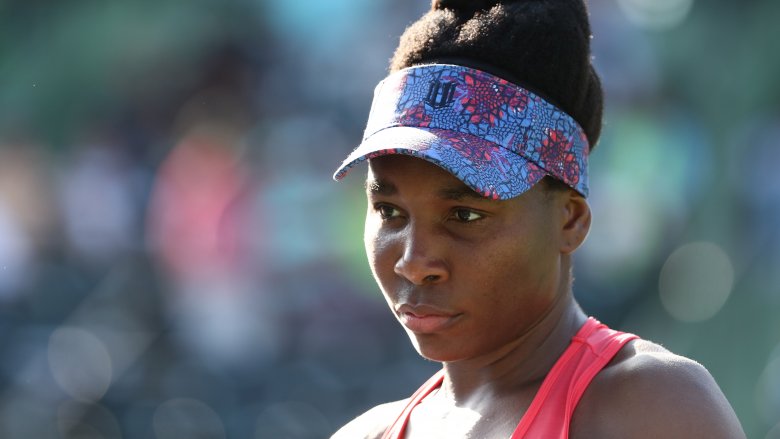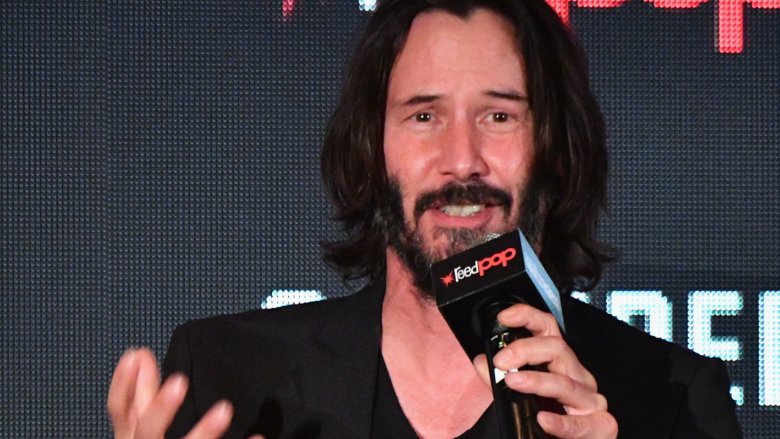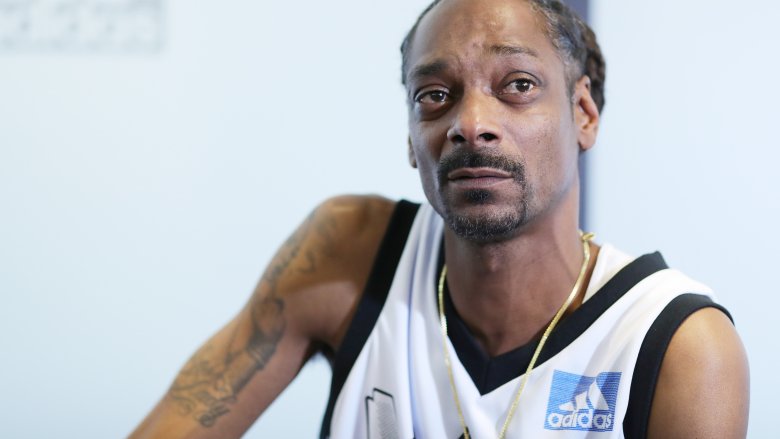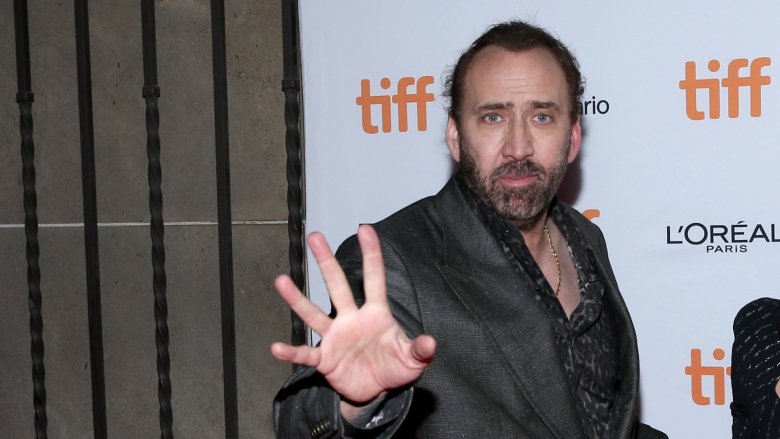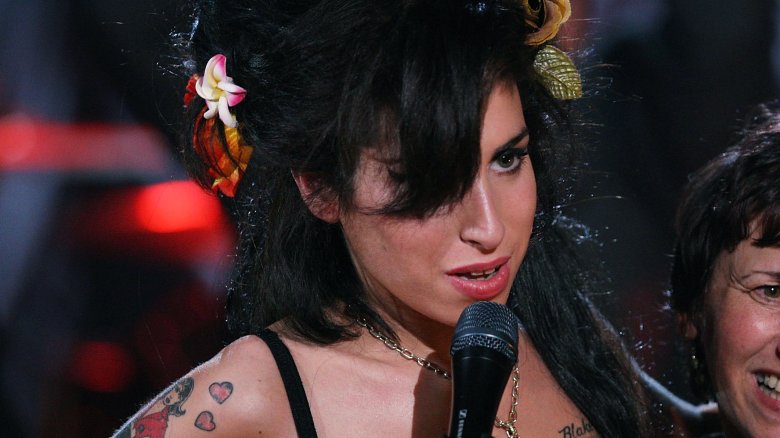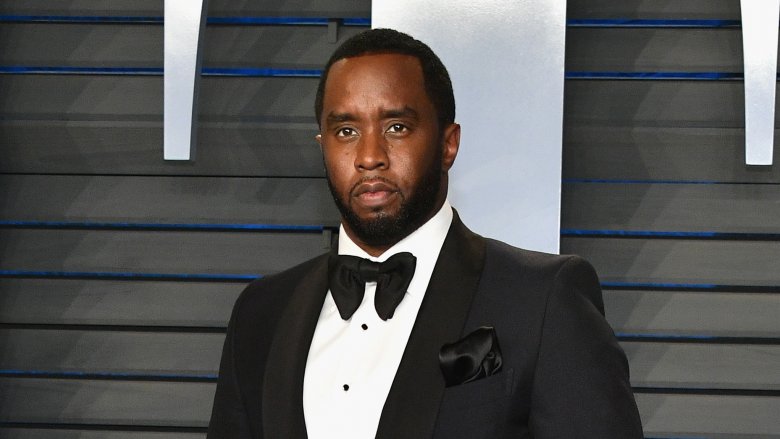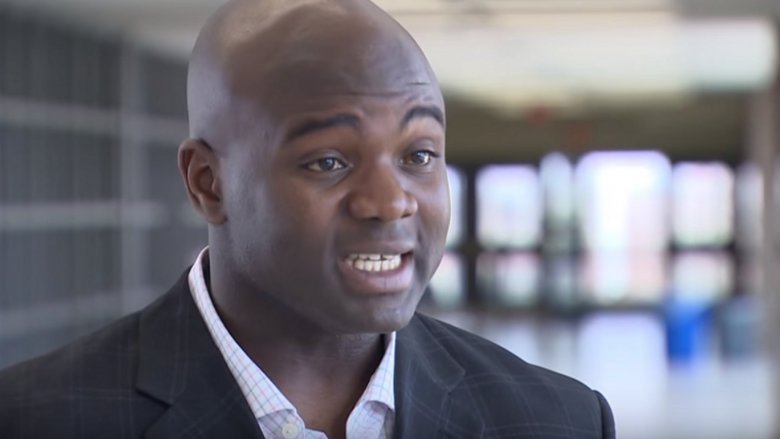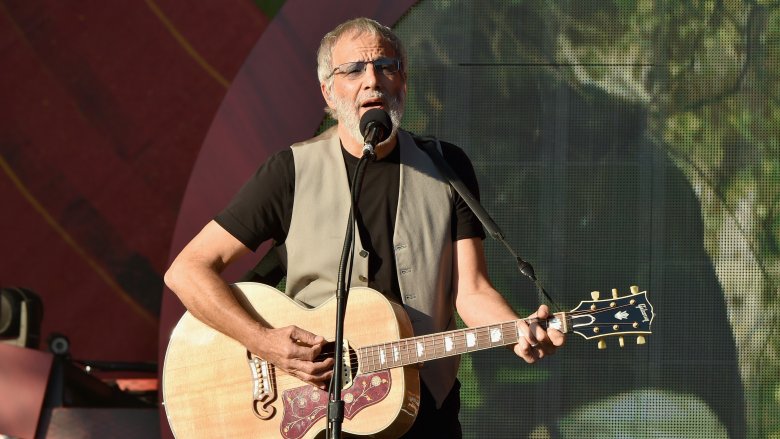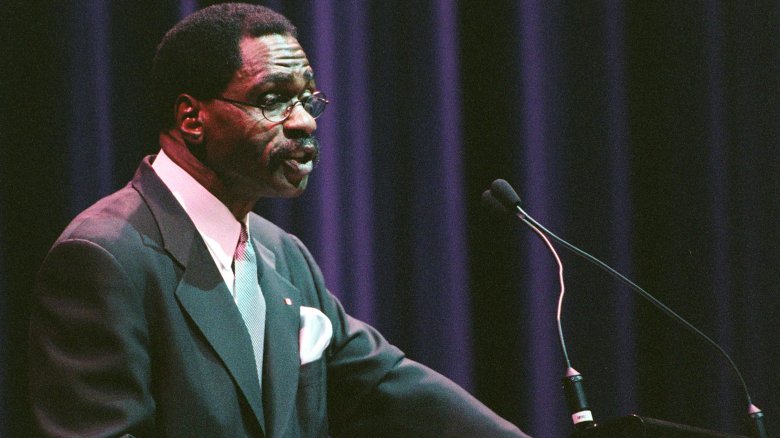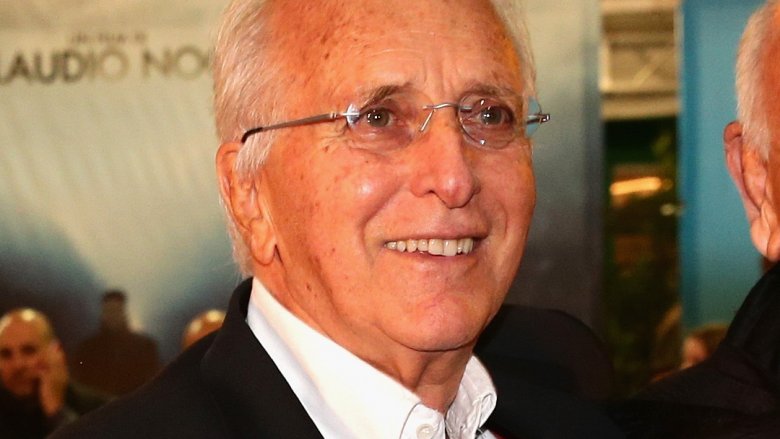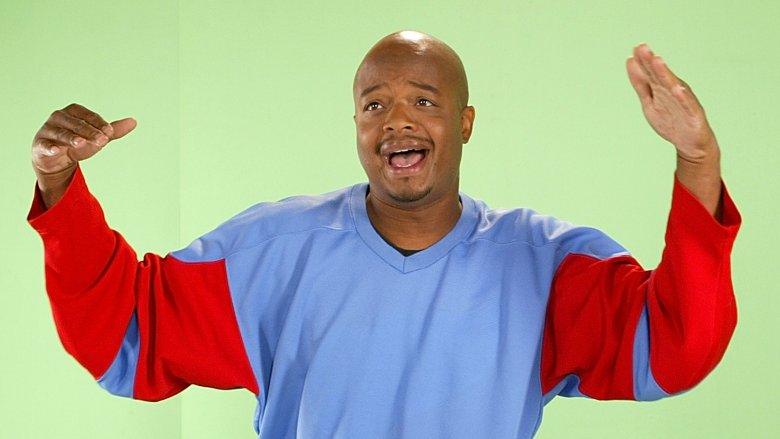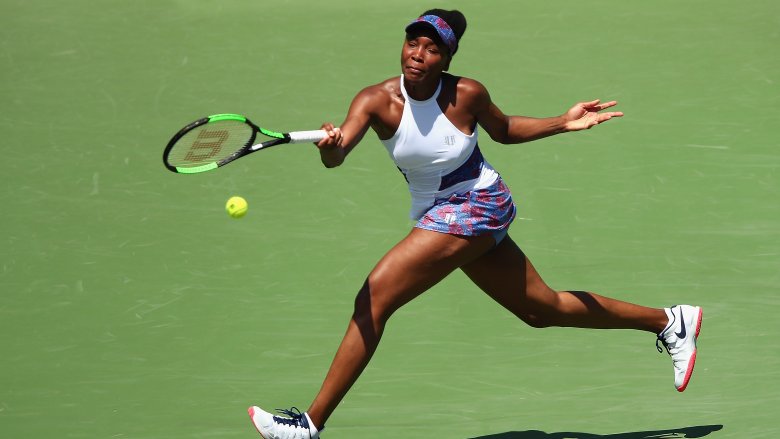Celebrities Accused Of Crimes They Never Committed
While not everyone framed for a horrible crime goes on the run like Harrison Ford in The Fugitive, the real world is full of grim cases where people were tried — and often sentenced — due to circumstances they had nothing to do with. Reasons for these situations vary quite a bit: such false accusations often occur because of racism or other prejudices, but they can also be caused by bad eyewitness reports, intentional setups, a misinterpreted signal... or sometimes, a person is just in the wrong place, at the wrong time.
Even the rich and powerful have to face false accusations. Unlike most people, celebrities have enough money to properly fight these cases in court. But on the other hand, being a big star also paints a big target on your back, bringing weird lawsuits out of the woodwork. Here are some of the biggest celebrities who faced accusations for which they were later acquitted or who are generally believed to be innocent.
Keanu Reeves got falsely accused of a hit and run
It's hard to imagine Keanu Reeves being accused of anything malicious. Often called "the nicest guy in Hollywood," Reeves is known for charitable actions like giving up some of his potential Matrix earnings to help filming continue. But in 2007, the Los Angeles Times reported that Reeves was sued by a paparazzi photographer named Alison Silva. Why? Evidently, it all started when Silva followed Keanu to a medical facility, where the actor was visiting a relative. Kind of a rude time to be flashing a camera in someone's face, right? Anyhow, Reeves ignored the photographer, got in his car to leave, and inched forward. At this point, Silva claims the actor crashed into him, causing a painful wrist fracture that rendered him unable to lift the heavy camera that was necessary for his profession. Keanu disputed Silva's hit-and-run story, stating that Silva tripped over his own feet.
Silva demanded $700,000, but when the case got to court, the paparazzi's "evidence" shattered worse than his wrist. First, a radiologist's assessment showed Silva's wrist fracture was from a childhood soccer injury rather than a recent incident. More damaging, Keanu's defense produced recent footage of Silva climbing over a fence to snap footage of Britney Spears, with the "too heavy" camera in hand. Silva admitted his lawsuit was a cash grab and that he'd exaggerated his pain levels. The case was thrown out in less than two hours.
Snoop Dogg was accused of murder
These days, Snoop Dogg is famous for being one of the world's most beloved rap artists, as well as hanging out with Martha Stewart and openly supporting his favorite medicinal plant. But back in 1993, he faced an accusation that made headlines, when the Los Angeles Times reported he had been charged with murder. Witnesses claimed the rapper and his bodyguard had murdered a man named Philip Woldemariam. Two other suspects were arrested, and Snoop himself, whose real name is Calvin Broadus Jr., showed up at the police station alongside his attorney. He was freed on a $1 million bail.
What happened? Well, the case lasted for three years, with the Los Angeles Times reporting that the jurors believed Broadus' defense. Snoop Dogg's lawyers said even though the rapper's bodyguard had shot Woldemariam, it had been in self-defense, as Woldemariam had been threatening them with a gun. Broadus was pronounced not guilty, and he left the courtroom holding his 2-year-old son.
No, Nicolas Cage didn't steal a dog
Count this as one of the weirder false accusations out there. Sure, Nicolas Cage has gotten up to some crazy shenanigans over the years, but he made a point to prove to the world that the outrageous dog stealing story wasn't true. If you haven't heard of this before, here's the rundown: the accusation came from actress Kathleen Turner, who starred with Cage in Peggy Sue Got Married back in 1986. In Turner's autobiography, she alleged that Cage had once "come across a chihuahua he liked and stuck it in his jacket," as well as stating that the famously odd actor had been arrested twice for driving drunk.
Now, Cage is an actor known for being eccentric, but he's also known for his love of animals, so these claims got him pretty angry. He sued Turner, and he must have done a good job of it because she eventually admitted that the book's claims were false. So no, Cage didn't get arrested for two DUIs, and he definitely didn't steal anyone's prized chihuahua.
Amy Winehouse was found innocent of punching a dancer
Amy Winehouse was one of the most iconic performers of the early 2000s, and her dramatic life story is still being analyzed to this day. However, it's worth noting that when the whole "punching a dancer in the face" story went to an actual trial, Winehouse was found innocent. According to The Telegraph, Winehouse was backstage at the Prince's Trust Ball in central London's Berkeley Square when the burlesque dancer in question, Sherene Flash, tried to get a photo with her. Winehouse reported feeling "intimidated and scared" by the dancer and asked her to wait a few minutes before doing the photo op so she could first finish talking to a friend. Allegedly, Flash didn't abide by this request, and the dancer instead "draped herself" over Winehouse's body. In response, the singer said she pushed Flash away out of fear, while Flash claimed to have received a punch in the eye.
What really happened? Well, almost all the witnesses were drunk at the time of the encounter, which complicated things. So, the judge instead looked at the evidence on Flash's body; a medical inspection of Flash's face did not demonstrate "the sort of injury that often occurs when there is a forceful punch to the eye," lending credence to Winehouse's version of events. As a result, assault charges were dismissed.
The shooting that P. Diddy got blamed for
Sean Combs, the rapper commonly known by such names as P. Diddy and Puff Daddy, faced criminal allegations back at the dawn of the 21st century. According to the New York Times, a confrontation in a Manhattan night club between men working for Combs and a felon named Michael Allen led to a shooting that injured three people. Charges were brought against Combs, his bodyguard, and his protege, and the prosecution further claimed Combs had tried to bribe his driver with $50,000 to say the gun was his. Combs said he had no role in the shooting, and further stated that when the shots were fired, he had been scared he was a target. The Los Angeles Times reported in 2001 that both Combs and his bodyguard were eventually pronounced not guilty, much to Combs' visible relief.
Combs would go on to deal with a far weirder and outlandishly falsified lawsuit 10 years later, according to The Guardian, when a woman named Valerie Turks sued him. Turks not only accused P. Diddy of fathering her child 24 years ago and never paying child support, she also blamed him for stealing a casino chip worth "zillions of dollars." Yes, zillions. It gets even weirder: She also claimed Combs had masterminded the 9/11 terrorist attacks alongside his ex Kim Porter and Rodney King (yes, the man who was brutally beaten up by L.A. cops in 1991). Not surprisingly, this case didn't go anywhere.
The football player framed by the cops
Orlando Bowen, originally from Jamaica, made his name as a football player for the Toronto Argonauts from 1999 to 2002. Two years later, the linebacker won a new contract, and things were looking up ... when suddenly, he got pulled over by two undercover cops. According to CBC, these officers brutally beat him, planted cocaine on him, and threw him in the back of the car. The assault gave Bowen a concussion, then he was left in a jail cell for 12 hours with no medical attention. As Bowen put it, "Going back over what happened that night, there really are no other reasons other than I'm a minority." His lawyer agreed, telling the press, "You don't need a statement from a police officer saying, 'I did this to him because he's black.' You can put two and two together."
As Bowen's case went to court, it was revealed that one of the arresting officers had been dealing cocaine, and Bowen was pronounced innocent. Unfortunately, his football career was finished due to the vicious concussion he sustained during the attack. In response, Bowen filed a $14 million lawsuit against the police department, which was settled out of court. Since then, he's gone on to become a notable public speaker, and he even forgave the officers who assaulted him. "I felt sorry for them," he said, adding, "Something must have happened at some point in their lives where they were broken. Hurt people hurt other people."
Cat Stevens was wrongfully deported from the USA
Though the singer of such classic songs as "Moonshadow" and "Wild World" was born under the name Steven Georgiou and today also goes by the name Yusuf Islam, the world will probably always know him best by his stage name, Cat Stevens. In 2004, CNN reported that the beloved British artist had been flying to Washington D.C. aboard United Airlines Flight 919 from London when the plane was diverted to Maine, where Yusuf was detained, questioned, and deported. The musician himself was more confused about this than anybody, particularly when Homeland Security Secretary Tom Ridge then publicly accused Yusuf of having connections with terrorist groups in the Middle East. Ridge didn't elaborate much on why the singer was on a terrorist watch list, but to groups like the Council on American-Islamic Relations, the unspoken reason was clear: Cat Stevens was a high-profile convert to Islam with a record of donating to many Islamic charity groups. According to CBS, Yusuf himself found the whole thing "totally ridiculous," telling the press, "everybody knows who I am. I am no secret figure. Everybody knows my campaigning for charity, for peace."
Whatever weirdness happened back in 2004, it seems that U.S. officials silently apologized for the matter over the next decade. In 2014, the singer triumphantly returned to the United States for a tour, proclaiming, "I feel very welcome now."
The innocent boxer who spent two decades in prison
When he first hit the middleweight boxing scene, Rubin "Hurricane" Carter mesmerized television audiences with his speed and ferocity in the ring. Ring Magazine named him one of the top middleweight contenders of 1963, according to CNN, after Carter knocked out 11 of his first 15 major opponents. But then, after losing his title bout in 1964, even worse luck befell the boxing star. In 1966, he was charged with a triple homicide at the LaFayette Bar and Grill and given three life sentences. Allegations of racial bias involved in Carter's trial stirred up immense controversy, and celebrities ranging from Muhammad Ali to Burt Reynolds spoke up about how he should be freed. Bob Dylan even wrote a song proclaiming Carter's innocence, and the ex-boxer himself penned an autobiography from prison. It wasn't until 1985 that a federal judge finally ruled that the original 1966 trial had been prejudiced and agreed to release Carter back into the world. By then, he had spent 19 years of his life in prison.
Carter went on to become an outspoken advocate for prisoners who were wrongly convicted of crimes, just like him. He served as the executive director of the Association in Defense of the Wrongly Convicted for 11 years, and his story was brought to the big screen in 1999, where he was played by Denzel Washington. By his later years, Carter was seen as a source of inspiration for many. He died in 2014 of prostate cancer.
The 'Cannibal Holocaust' director was put on trial for killing his cast
There's a good reason Cannibal Holocaust is considered one of the most controversial movies ever made. Ruggero Deodato's horror movie, which was styled as a found-footage film decades before that subgenre took off, presented itself as being a videotape recovered from a crew of American filmmakers who supposedly ventured into the Amazon jungles and encountered a hostile tribe of "savages" (all of whom are presented in a racist, exploitative manner). The film's depiction of violent acts such as torture, rape, and cannibalism were startlingly realistic ... so realistic, in fact, that the director got in trouble with the law.
See, in order to increase the seeming authenticity of the film, io9 says Deodato had it written into the contracts of his actors that they had to stay out of the media spotlight for one year. This became problematic, according to The Guardian, when an Italian court actually put Deodato on trial. The charge? That he had murdered his actors, all of whom were, conveniently enough, mysteriously missing. To avoid imprisonment, Deodato broke the actors' contracts and had them come to court, making it clear he hadn't murdered them. One thing he didn't fake, however, was the violent slaughter of animals in the film, including a monkey being decapitated. He and the producers were fined for animal cruelty and given a four-month suspended sentence.
Todd Bridges went through hard times
Todd Bridges will forever be remembered for Diff'rent Strokes, where he played Willis Jackson — yes, that's the same "Willis" whose name became a meme, thanks to Gary Coleman — but in the decades since then, he's been in some rough situations. To start, UPI reported in 1989 that Bridges had been charged with murder for reportedly firing eight rounds into a convicted Texas drug dealer named Kenneth "Tex" Clay. Bridges reported being high on cocaine at the time of the incident — he was using it every day, at that point — but stated that even so, he didn't remember shooting Clay. As the case concluded, Bridges was acquitted of both murder charges. However, he still faced future charges of assault with a deadly weapon, and this case was delayed.
Sadly, less than a year later, the Los Angeles Times wrote that Bridges had been arrested for cocaine possession. Nonetheless, when the assault with a deadly weapon charges were finally brought against Bridges by late 1990, he was found not guilty, according to UPI, as the jurors argued that the prosecution had not provided ample evidence. Since those dark times, life seems to have turned around for Bridges, as he went on to co-author a 2010 memoir, Killing Willis: From Diff'rent Strokes to the Mean Streets to the Life I Always Wanted.
A jury decided Venus Williams was driving correctly
In June 2017, a terrible car accident happened in Palm Beach Gardens, Florida, according to Sports Illustrated. Tennis star Venus Williams was driving about 5 mph through an intersection when a Hyundai Accent driven by a woman named Esther Barson pummeled into the passenger side of Williams' car. Though Williams herself was uninjured, Barson had a cracked sternum and wrist, and her 78-year-old passenger, Jerome Barson, suffered ruptured arteries that took his life a few weeks later.
Initially, Williams was blamed for the crash, with eyewitness reports stating she'd run a red light. In the ensuing trial, video surveillance was brought to light as evidence, revealing that the only reason Williams had slowed down in the intersection was to avoid crashing into a Nissan Altima that had abruptly turned in front of her. Furthermore, it turned out that Williams had actually driven through a green light, not a red one. In the end, this proved Williams was not responsible for the car crash, though it rendered the accident itself no less tragic. Williams did not blame Barson for the accident either, as some celebrities might have. Instead, the tennis champion expressed her condolences and prayers to the Barsons for the loss of their elderly family member.
